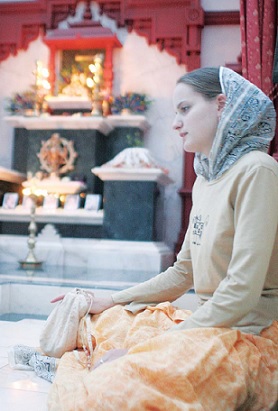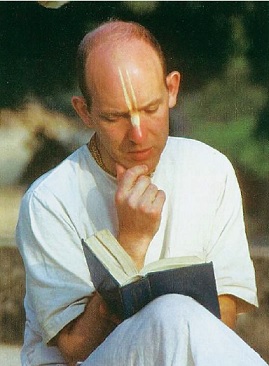
Creating a balance between the temporary and eternity
One of the essential activities of the sadhu, and of the most successful people, is creating “sacred space,” daily quite time. Some suggest this is the time to become more clearly focused on your material goals, and what you wish to accomplish in your day. This is important. We need sacred time every day where we put our external world on hold and make a connection that transcends this world. In our modern materialistic world and life, doing so is essentially important. We tend to be overly absorbed in pursuing material goals, and in doing so we are starving our souls.
When Srila Prabhupada incorporated ISKCON, one of the seven purposes was to:
Systematically propagate spiritual knowledge to society at large and to educate all peoples in the techniques of spiritual life in order to check the imbalance of values in life and to achieve real unity and peace.
Srila Prabhupada is addressing a critical problem: our lives are out of balance. We place too much emphasis on the material, the physical body and all the stuff we accumulate, and give little or no importance to the transcendent. This is a huge paradox and the ultimate form of self-neglect because we are spiritual beings who continue to exist long after the demise of our physical bodies and possessions.
Unfulfilled spiritual needs create an unfulfilled life, even when material needs are satisfied. “Sacred space” is so important because it is a time to create balance between the temporal and the eternal. It is time to rest and restore our souls, a daily Sabbath. It is a special time to more deeply connect with ourselves and our Creator.
I have been doing this daily for the past 45 years and it has proven to be the most valuable activity in my day – and in my life.
What do we do in our “sacred space?” The sacred has always been connected with ritual, prayer, meditation, study, reflection and ceremony. All these activities take you on a wonderful journey within.
When is it best to go into our “sacred space?” According to the Vedas, an hour and a half before sunrise is the best time of the day for spiritual practice. The sacredness, peace and power of the early morning is God’s gift to help us more easily raise our consciousness and connect with our purpose. Utilizing this special time of the day is truly a lifechanger.
The Vedas teach that anything done in the early morning hours will be more effective than if done later and will affect our entire day. So, spending daily time in our “sacred space” first thing in the morning makes a huge difference in our lives. Having a cup of tea and reading the news is not the right way to start the day.
One of Srila Prabhupada’s fundamental instructions to his students was to rise no later than 4 am. This principle was central to his mission. And he set the example, rising after a few hours of rest to study, write and chant. When asked how he was able to do this, he simply said, “It requires practice.”
Our body is energized by our mind. When inspired, we sleepless. Srila Prabhupada’s first students were hippies. Their habit was to sleep up to ten hours day. As they became inspired in spiritual life, they began to sleep much less, some even sleeping only four or five hours a night.
Not only is “sacred space” most powerful in the early morning, if we are not up early we may not find time for it at all. Thus, sleeping less is the best way to guarantee that we make it into to our “sacred space” every day.
If we are not rising early, how do we make the transition? The inspiration to do this must come from within. Others can encourage us. They can give us knowledge that will impact us. But they cannot change us. So if you make the desire to rise early your own, then the inspiration to get up early and go into your sacred space will become a regular practice. Here are some ways that we find our own inspiration to do our daily sacred practice.
· Understand and reflect on the vital importance of sacred space, and the need for it in your life.
· Meditate on the benefits of the practice. Visualize what your life will be like if you make “sacred time” for yourself daily.
· Envision what you will be missing by not doing this sacred practice.
· Realize the pain of not rising early and going into your sacred space is greater than any discomfort you experience by rising early.

· Focus on the things you love doing (that you don’t get time for) that you would do in your sacred space (writing, reading, meditating, chanting mantras, praying, worship, etc.).
· Admire people who follow this practice (many who do this are achieving what you wish to achieve).
· Understand you’ll be enriched in important life giving ways that only a sacred practice brings.
· Know that by doing the practice daily, it will become a habit.
To get further inspired to rise early and create “sacred space,” let’s look further at what “sacred space” is, what we do there, and what we get from it.
Sacred Space is a special place you journey to every morning. It is your daily re-creation time. In your “sacred space” you nourish your sacred self and your Divine connection. It is where you go to lose the world and gain your soul.
Let’s look at some of the more important practices done in “sacred space” and how you can use them.
Prayer
The importance of goal setting is well known. Goal setting fixes both our intention and attention on our purpose. Prayer is a means of Divine partnering in achieving our ends.
Prayer also energizes our goals because we express our intentions from our heart. Even more important, prayer helps us clarify our goals by putting us in touch with Divine guidance. Nothing is worse than fulfilling a goal we later realize was not what we wanted (or needed).
Study and Reflection

There are three aspects to the Vedic system of education: knowledge, reflection and application. We require quiet time to study sacred texts, reflect on what we are learning and to consider how to apply the teachings in life. This kind of reflection takes us to a place in which we gain deeper insight into the nature of the life we are living.
Ritual, Puja, Ceremony
Ritual means a daily activity like visiting a temple or mosque or bowing down. Puja can be something as simple as offering a flower or incense on your altar. Ceremony can simply take the form of giving thanks for what you have in life.
Meditation and Mantra Chanting
Mantra is a spiritual sound. It purifies and uplifts consciousness. Chanting and meditating on mantras are the foundation of any successful sacred practice. It is the quickest way to self-realization, peace and joy. There are many other benefits you get from chanting.
I would like to share with you the japa (soft chanting) meditation Srila Prabhupada gave me, his disciples and the world. It is the chanting of the maha-mantra.
Hare Krishna Hare Krishna Krishna Krishna Hare Hare
Hare Rama Hare Rama Rama Rama Hare Hare
Try adding five to ten minutes of this chanting to your daily sacred practice. It has helped me more than anything else I have ever done!
Enjoy your time in your “sacred space.” Have a happy journey. The real exploration is the world within.
Mahatma Dasa, a disciple of Srila Prabhupada, joined ISKCON in 1969. He is well known in ISKCON for his music and seminars. Visit his website: www.mahatmawisdom.com
